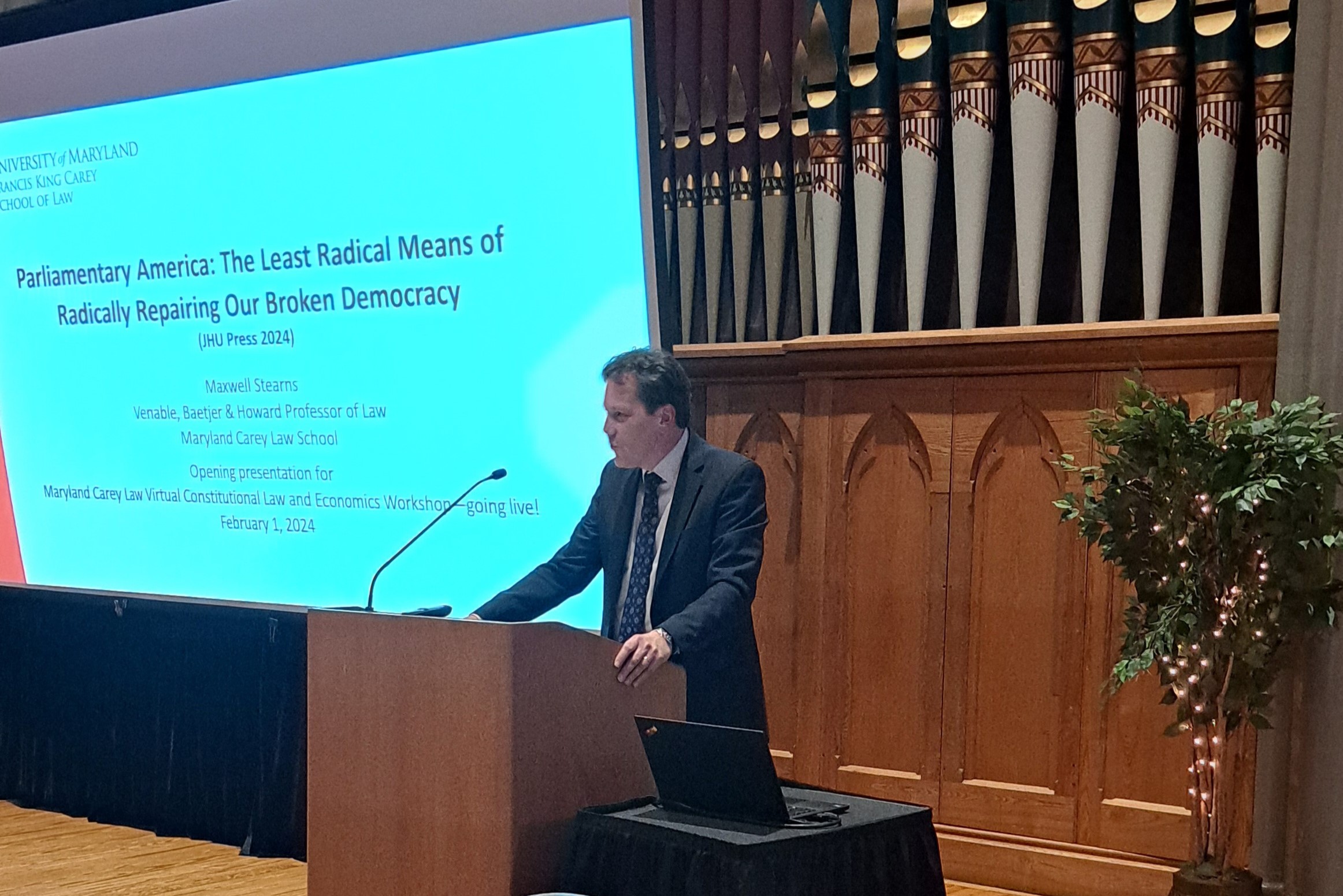Scholars from across the United States and abroad convened at the University of Maryland Francis King Carey School of Law on Feb. 1-3 for the Maryland Carey Law [Virtual] Constitutional Law and Economics Workshop, happening for the first time in person.
Conceived by Professor Max Stearns in 2020, the workshop originally brought together a community of top scholars with interests at the intersection of economics and constitutional law via Zoom during the pandemic. Around 10 faculty from institutions across the country formed a core group in the workshop’s biweekly meetings. Word spread, and participants in India, Israel, Germany, Italy, and Canada began submitting papers to present.
With in-person conferences back in full swing, Stearns and Professor Michael Gilbert, vice dean at the University of Virginia School of Law and a regular participant, decided this year to begin offering the workshop as a live conference at their respective campuses on an alternating basis.
“We were thrilled to host the first in-person Constitutional Law and Economics Workshop at Maryland Carey Law,” said Stearns. “When you assemble so many smart people in one room, the magic begins. I look forward to traveling to UVA, my alma mater, in two years, when it’s Vice Dean Gilbert’s turn to host.”
Participants this year hailed from 18 different institutions, including Northwestern Law; Emory University School of Law; Tel Aviv University; Western University, Ontario; University of Wisconsin Law School; and Maryland Carey Law. Select students from the Maryland Law Review and Stearns’s Constitutional Law and Law and Economics courses also attended. Sessions explored judicial processes, constitutional process and reform, and the future of scholarship that blends analysis from economics with constitutional law in a rich conversation, featuring Emeritus Professor Tom Ulen of the University of Illinois Law School.
The workshop kicked off with a special event celebrating the forthcoming publication of Parliamentary America: The Least Radical Means of Radically Repairing Our Broken Democracy (Johns Hopkins University Press, March 2024), a new book by Stearns. Introduced by Hank Chambers, Austin E. Owen Research Scholar and Professor of Law at University of Richmond School of Law, Stearns presented a book talk, outlining his plan to fix our broken democracy through three new amendments—expanding the House of Representatives, having House party coalitions choose the president, and letting the House end a failing presidency based on no confidence.
Stearns is the Venable, Baetjer & Howard Professor of Law at Maryland Carey Law, where he teaches Constitutional Law I and II (Governance and Individual Rights) and Law and Economics. Previously, he was a professor at George Mason University School of Law and has taught courses in law and economics, public choice, and constitutional law at the University of Aberdeen, Aberdeen, Scotland; the Buchmann Faculty of Law, Tel Aviv University, Tel Aviv, Israel; Griffith University, Brisbane, Australia; and Canterbury University Department of Economics and Finance, Christchurch, New Zealand (as a visiting Erskine Fellow). He has been a visiting professor at the University of Florida, Fredric G. Levin College of Law, and at the University of Michigan Law School.
Stearns is also the author of Law and Economics: Private and Public (West Academic 2018) (with Todd Zywicki and Tom Miceli) and Constitutional Process: A Social Choice Analysis of Supreme Court Decision Making (University of Michigan Press, paperback edition 2002), among other titles. His scholarly articles appear in leading academic journals, including Yale Law Journal, University of Pennsylvania Law Review, California Law Review, Stanford Law Review, Georgetown Law Journal, Notre Dame Law Review, Vanderbilt Law Review, and The University of Pennsylvania Journal of Constitutional Law.

